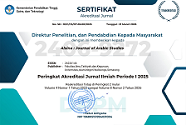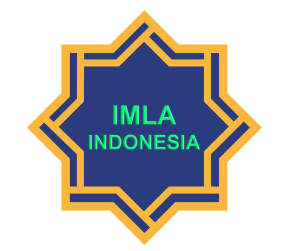Istirātījīyāt Taʿlīm ʿAnāshir al-Lughah wa-al-Mahārāt al-Lughawīyah al-ʿArabīyah
DOI:
https://doi.org/10.21580/alsina.3.2.8592Keywords:
Arabic Learning, Arabic Element, Arabic Skills, StrategiesAbstract
Arabic is the language of the Qur'an and is one of the languages of international communication. Learning Arabic is a must for everyone, especially Muslims, but over time many have experienced difficulties in learning Arabic because the material in Arabic is so complex and abundant that teachers need strategies in teaching Arabic. Learning requires the use of learning strategies so that students do not find it difficult. The application of Arabic learning strategies is so that students can receive the material more effectively. The choice of strategy should be based on the language skills taught to students. This research aims to analyze strategies of learning Arabic elements and Arabic skills. The research method is library research which is some of the data resources took by books and journals; then researcher analyze the data with content analysis methods. In designing learning strategies, several components must be considered, namely preliminary learning activities, delivery of information, student participation, test activities, and follow-up activities. There are six types of Arabic learning strategies based on language skills, namely vocabulary learning strategies, grammar learning strategies, listening learning strategies, speaking learning strategies, reading learning strategies, and writing learning strategies.
Downloads
References
Ahmadi, Iif Khoiru, Sofan Amri, and Tatik Elisah. Strategi Pembelajaran Sekolah Terpadu. Jakarta: Prestasi Pustaka, 2011.
Asrori, Imam. Strategi Belajar Bahasa Arab: Teori & Praktek. Malang: Misykat, 2011.
Barnabas, Ahmad, Zainal Rafli, and Yumna Rasyid. “Implementation of Cognitive Strategy in Arabic Listening Class.” In Proceedings of the International Conference on Education, Language and Society - Volume 1: ICELS, 387–91. SciTePress, 2019. https://doi.org/10.5220/0008999403870391.
Chejne, Anwar G. “Arabic: Its Significance and Place in Arab-Muslim Society.” Middle East Journal 19, no. 4 (1965): 447–70. http://www.jstor.org/stable/4323917.
El-Tingari, Salih Mahgoub. “Strategies for Learning Second Language Skills: Arabic Speaking Skills in the Malaysian Context.” International Journal of English Language Teaching and Linguistics 1, no. 1 (2016): 19–34. http://www.ijeltal.com/index.php/ijeltal/article/view/2/2.
Kaptein, Nico J.G. “Arabic as a Language of Islam Nusantara: The Need for an Arabic Literature of Indonesia.” Heritage of Nusantara: International Journal of Religious Literature and Heritage 6, no. 2 (2017): 237–51. https://doi.org/10.31291/hn.v6i2.372.
Kemendikbud. Peraturan Menteri Pendidikan dan Kebudayaan Republik Indonesia Nomor 41 Tahun 2014 tentang Standar Proses untuk Satuan Pendidikan Dasar dan Menengah (2014).
Khalilullah, M. “Strategi Pembelajaran Bahasa Arab Aktif (Kemahiran Qira’ah Dan Kitabah).” Sosial Budaya 8, no. 1 (2011): 152–67. https://doi.org/10.24014/SB.V8I1.354.
Lubis, Ali Asrun. “Konsep Strategi Belajar Mengajar Bahasa Arab.” Darul Ilmi: Jurnal Ilmu Kependidikan Dan Keislaman 1, no. 2 (2013). https://doi.org/10.24952/DI.V1I02.244.
Mursyidah, Mursyidah, and Julia Julia. “Istirâtîjiyyah Ta’lîm Al-Lughah Al-‘Arabiyyah Fil-Madrasah Ats-Tsânawiyyah Aulia Cendekia Palembang.” Taqdir 4, no. 2 (2019): 1–13. https://doi.org/10.19109/taqdir.v4i2.3119.
Musthofa, Syaiful. Strategi Pembelajaran Bahasa Arab Inovatif. Malang: UIN-Maliki Press, 2011.
Mustofa, Bisri, and Abdul Hamid. Metode & Strategi Pembelajaran Bahasa Arab. Malang: UIN-Maliki Press, 2012.
Nurhidayati, Irhamni, and Moh. Ainin. “Learning Strategy Patterns in Developing Skills for Listening of Arabic Speech.” KnE Social Sciences 4, no. 4 SE-Articles (2020). https://doi.org/10.18502/kss.v4i4.6486.
Pamessangi, Andi Arif. “Istirâtîjiyyah Ta’lim Al-Lughah Al-‘Arabiyyah ‘ala Asâsi Khasâ’is Al-Ṭalabah.” Jurnal Alfazuna : Jurnal Pembelajaran Bahasa Arab Dan Kebahasaaraban 5, no. 2 (2021): 138–54. https://doi.org/10.15642/alfazuna.v5i02.1024.
Ritonga, Mahyudin, Pahri, Rahmawati, Syahraini Tambak, Ahmad Lahmi, Imratul Handayani, and Slamet Riyadi. “Strategies for Developing Tarkib Arabic Exercises Instruments for Strengthening the Understanding of Yellow Book.” International Journal of Entrepreneurship 25, no. Special Issue 1 (2021).
Rouyan, Nurazan Mohmad, Isyaku Hassan, Nik Hanan Mustapha, Nik Farhan Mustapha, and Mohd Nazri Latiff Azmi. “Developing Strategic Reading Skills among University Students of Arabic as a Foreign Language in Malaysia.” International Journal of Scientific & Technology Research 9, no. 8 (2020): 496–503. http://www.ijstr.org/final-print/aug2020/Developing-Strategic-Reading-Skills-Among-University-Students-Of-Arabic-As-A-Foreign-Language-In-Malaysia.pdf.
S, Febry Ramadani, and R. Umi Baroroh. “Strategies and Methods of Learning Arabic Vocabulary.” Ijaz Arabi Journal of Arabic Learning 3, no. 2 (2020). https://doi.org/10.18860/ijazarabi.v3i2.10062.
Salleh, Kamarudin. “Arabic as a Language between Qur‘Anic (Sacred) and Historical Designations.” Millah 7, no. 1 (2007). https://doi.org/10.20885/millah.vol7.iss1.eng.art5.
Sunhaji. “Strategi Pembelajaran: Konsep Dan Aplikasinya.” INSANIA: Jurnal Pemikiran Alternatif Pendidian 13, no. 3 (2008): 1–13.
Toemah, Roushdy A. Taʿlīm Al-ʿArabīyah Li-Ghayr Al-Nāṭiqīn Bihā: Manāhijuhū Wa-Asālībuhū. Rabat: ICESCO, 1989.
Yusraini. “Strategi Pembelajaran Bahasa Arab Dan Implikasinya Terhadap Efektivitas Pembelajaran Bahasa Arab.” Media Akademika 27, no. 3 (2012).
Downloads
Published
How to Cite
Issue
Section
License
Copyright
The copyright of the received article shall be assigned to the publisher of the journal. The intended copyright includes the right to publish the article in various forms (including reprints). The journal maintains the publishing rights to published articles. Authors are allowed to use their articles for any legal purposes deemed necessary without written permission from the journal, but with an acknowledgment to this journal of initial publication.
Licensing
In order for Alsina: Journal of Arabic Studies to publish and distribute research articles, the editors need publishing rights (transferred from author to publisher). This agreement relates to the transfer/publishing copyright license to Alsina: Journal of Arabic Studies but the authors still have significant rights to use and share their published articles.
Alsina: Journal of Arabic Studies supports the need for writers to share, disseminate and maximize the impact of their research and their rights on any database. As a journal article writer, you have the right to various uses of your articles, including that by the institution or company where you work. Copyright can be used without the need for special permission. Authors who publish articles in the Alsina: Journal of Arabic Studies have broad rights to use their work for teaching and scientific purposes without requesting permission, including:
- Use by the author for lectures, presentations, or conferences, with distribution of copies to participants;
- Distribution to colleagues for research use;
- Use in compilations of the author's subsequent work;
- inclusion in a thesis or dissertation;
- Reuse of sections or excerpts from articles in other works (with full acknowledgment of the final article);
- Preparation of derivative works (other than commercial purposes) (with full acknowledgment of the final article);
- Voluntary posting on open websites operated by authors’ or writers' agencies for scientific purposes
When submitting a manuscript, authors do so on the understanding that if accepted for publication, the copyright for publishing (publishing right) of the article shall be assigned/transferred to Alsina: Journal of Arabic Studies.
Authors whose articles are accepted for publication will receive confirmation via email and sent a Copyright Transfer Agreement.


 Accreditation
Accreditation 
 In Collaboration with
In Collaboration with 

 Visitors
Visitors  Article Template
Article Template





